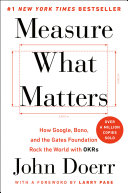

Measure What Matters by John Doerr is a compelling exploration of the Objectives and Key Results (OKRs) framework, a goal-setting methodology that has transformed the way organizations approach performance management and...
Continue readingObjectives and Key Results (OKRs) form the backbone of the book's methodology. OKRs are a goal-setting framework that helps organizations define their goals (objectives) and track their outcomes (key results). The object...
Continue readingOne of the core principles of Measure What Matters is the importance of focus and alignment across all levels of an organization. The book argues that organizations often struggle with too many competing priorities, lead...
Continue readingTransparency is a crucial aspect of the OKR framework outlined in Measure What Matters. The book advocates for open communication regarding goals and progress, suggesting that all employees should have access to the OKRs...
Continue readingMeasure What Matters stresses the importance of learning and adaptation in the pursuit of objectives. The book posits that organizations should view their OKRs as living documents that can evolve based on feedback and ch...
Continue readingImplementing OKRs is not just a process change; it often requires a cultural shift within an organization. Measure What Matters discusses the need for leaders to champion this change and model the behaviors they wish to ...
Continue readingEngagement and motivation are central themes in Measure What Matters. The book argues that when employees are involved in the goal-setting process and understand how their work contributes to the organization's success, ...
Continue readingMeasure What Matters is rich with case studies and real-world applications of the OKR framework. The book provides examples from a variety of organizations, including tech giants like Google and Intel, illustrating how t...
Continue readingThe reading time for Measure What Matters depends on the reader's pace. However, this concise book summary covers the 7 key ideas from Measure What Matters, allowing you to quickly understand the main concepts, insights, and practical applications in around 23 min.
Measure What Matters is definitely worth reading. The book covers essential topics including Objectives and Key Results (OKRs), Focus and Alignment, Transparency and Communication, providing practical insights and actionable advice. Whether you read the full book or our concise summary, Measure What Matters delivers valuable knowledge that can help you improve your understanding and apply these concepts in your personal or professional life.
Measure What Matters was written by John Doerr.
If you enjoyed Measure What Matters by John Doerr and want to explore similar topics or deepen your understanding, we highly recommend these related book summaries:
These books cover related themes, complementary concepts, and will help you build upon the knowledge gained from Measure What Matters. Each of these summaries provides concise insights that can further enhance your understanding and practical application of the ideas presented in Measure What Matters.